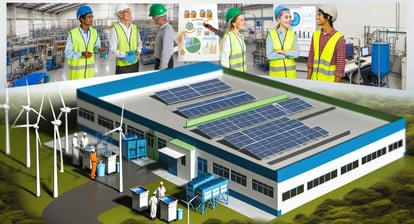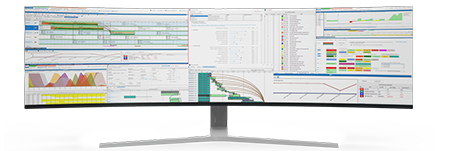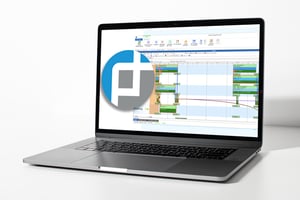ECO-FRIENDLY PRODUCTION PLANNING
In an era where sustainability is at the forefront of business priorities, the manufacturing industry is undergoing a significant transformation to meet the demands of environmentally conscious consumers. Medical manufacturing facilities, in particular, are recognizing the need to align their production processes with eco-friendly practices.
This blog aims to guide Production Schedulers in medical manufacturing facilities through the intricacies of Production Planning for Eco-Friendly Products. We will explore the role of advanced planning tools like PlanetTogether and look into the crucial aspect of integrating these tools with leading ERP systems such as SAP, Oracle, Microsoft, Kinaxis, Aveva, and others.

The Importance of Eco-Friendly Production
Before looking into the specifics of production planning, let's underscore the significance of adopting eco-friendly practices in medical manufacturing. The healthcare industry is under increasing pressure to reduce its environmental impact. By prioritizing sustainability in production processes, medical manufacturing facilities can not only meet regulatory requirements but also contribute to a healthier planet.
Reducing waste, optimizing energy consumption, and sourcing eco-friendly materials are critical steps in the journey toward sustainability. As a Production Scheduler, your role is pivotal in steering the production line towards these goals. This blog will guide you through the strategies and tools that can aid in effective Production Planning for Eco-Friendly Products.


The Role of PlanetTogether in Eco-Friendly Production Planning
PlanetTogether is a powerful production planning and scheduling software that can significantly enhance your ability to align production processes with sustainability goals. Its advanced algorithms and real-time data analysis capabilities empower Production Schedulers to make informed decisions that minimize waste, reduce energy consumption, and optimize resource utilization.
Here are some key features of PlanetTogether that can be leveraged for eco-friendly production planning:
Demand Forecasting: Accurate demand forecasting is the cornerstone of sustainable production planning. PlanetTogether's forecasting capabilities enable you to anticipate demand fluctuations, preventing overproduction and unnecessary resource consumption.
Resource Optimization: Efficient utilization of resources is crucial for reducing the environmental footprint of production. PlanetTogether's optimization algorithms help you allocate resources effectively, minimizing idle time and energy consumption.
Production Scheduling: Timely and optimized scheduling ensures that production processes run smoothly, minimizing downtime and maximizing efficiency. PlanetTogether's dynamic scheduling capabilities allow you to adapt quickly to changes in demand or unforeseen disruptions.
Inventory Management: Excessive inventory can lead to waste and increased energy consumption. PlanetTogether helps you maintain optimal inventory levels, preventing overstocking and reducing the need for excess storage space.

Integrating PlanetTogether with ERP Systems
To truly harness the power of production planning for eco-friendly products, it is essential to integrate advanced planning tools like PlanetTogether with your existing ERP system. Integration enhances data visibility, ensures seamless communication across departments, and provides a holistic view of your entire manufacturing ecosystem.
Let's explore how integration with popular ERP systems can elevate your eco-friendly production planning:
SAP Integration: Integrating PlanetTogether with SAP streamlines data exchange between production planning and other critical business functions. Real-time synchronization of data ensures that everyone in the organization is working with the latest information, facilitating more informed and sustainable decision-making.
Oracle Integration: Oracle ERP integration enables a seamless flow of information between PlanetTogether's planning capabilities and Oracle's comprehensive suite of business applications. This integration optimizes the entire production process, from order placement to delivery, with a focus on sustainability.
Microsoft Dynamics Integration: By integrating PlanetTogether with Microsoft Dynamics, you create a unified platform for production planning and business operations. This synergy allows for better coordination, reducing lead times, and optimizing resource usage for a more eco-friendly production process.
Kinaxis Integration: The integration of PlanetTogether with Kinaxis RapidResponse provides a holistic view of the supply chain. This visibility allows Production Schedulers to make data-driven decisions that align with sustainability objectives, such as reducing transportation emissions and minimizing excess inventory.
Aveva Integration: Aveva's integration with PlanetTogether enhances visibility into manufacturing processes, enabling better control over production variables. This integration facilitates data-driven decisions that align with eco-friendly production goals, such as minimizing water and energy consumption.

The Benefits of Integration for Eco-Friendly Production Planning
Data Accuracy and Visibility: Integration eliminates silos by ensuring that data flows seamlessly between different systems. This ensures data accuracy and provides real-time visibility into production processes, enabling more informed decision-making.
Efficient Communication: Integrated systems facilitate efficient communication between different departments, preventing miscommunications and reducing the likelihood of errors. This is particularly crucial when implementing eco-friendly initiatives that require close collaboration across various functions.
End-to-End Traceability: Integration allows for end-to-end traceability of materials and products throughout the supply chain. This transparency is essential for meeting regulatory requirements and ensuring that sustainable practices are adhered to at every stage of production.
Adaptability to Changes: The dynamic nature of production planning requires the ability to adapt quickly to changes in demand, supply, or other variables. Integrated systems provide the agility needed to respond promptly to market fluctuations and align production with sustainability goals.
Continuous Improvement: Integrated systems provide a wealth of data that can be analyzed for continuous improvement. By leveraging analytics and reporting tools, Production Schedulers can identify areas for optimization, waste reduction, and energy efficiency, driving ongoing sustainability improvements.
Challenges and Considerations
While the benefits of integrating PlanetTogether with ERP, SCM, and MES systems for eco-friendly production planning are clear, it's essential to be aware of potential challenges and considerations:
Implementation Costs: Integrating advanced planning tools with existing systems may involve initial costs. However, these investments are often justified by the long-term benefits in terms of sustainability, efficiency, and cost savings.
Training and Change Management: Employees may need training to adapt to new integrated systems. Effective change management strategies should be employed to ensure a smooth transition and minimize disruptions to production processes.
Data Security: Integration involves the exchange of sensitive data between systems. Implementing robust security measures is crucial to safeguarding information and maintaining the integrity of the production planning process.
Compatibility Issues: Ensuring compatibility between different systems can be a challenge. Working closely with IT professionals and software providers during the integration process is essential to address compatibility issues and ensure smooth operation.
As a Production Scheduler in a medical manufacturing facility, embracing eco-friendly production planning is not just a choice but a responsibility. Leveraging advanced planning tools like PlanetTogether and integrating them with ERP, SCM, and MES systems is the key to achieving sustainable and efficient production processes.
By adopting a holistic approach to eco-friendly production planning, you contribute to the broader goals of your organization, meet regulatory requirements, and satisfy the demands of environmentally conscious consumers. The integration of cutting-edge technology with established ERP systems positions your facility for success in a rapidly evolving manufacturing landscape.
Remember, the journey towards sustainability is an ongoing process of improvement. Embrace the tools and strategies outlined in this blog, collaborate with cross-functional teams, and stay informed about emerging technologies to ensure your medical manufacturing facility remains at the forefront of eco-friendly production practices.
Together, we can build a greener and healthier future for both our industry and the planet.



